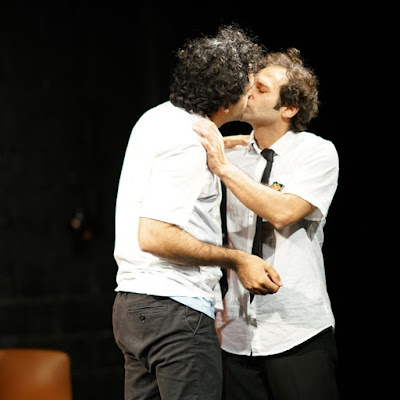Review: In "Drowning in Cairo," Those Who Tell Don’t Die, But Sometimes They Drown
Drowning in Cairo
Written by Adam Ashraf Elsayigh
Directed by Celine Rosenthal
Presented by National Queer Theater at IRT Theater
154 Christopher Street, Manhattan, NYC
June 13-16, 2019
 |
| Photo credit: Sean Velas |
It is also the incident Adam Elsayigh takes up in his play Drowning in Cairo. The play is part of the Criminal Queerness Festival in NYC that goes through early July at the IRT Theater in the West Village. Each play focuses on a different country where same-sex relations are criminalized. Drowning in Cairo, directed by Celine Rosenthal, follows the fates of three men whose lives were changed because of the Queen Boat incident. Moody (Arif Silverman) is the son of wealthy and connected Egyptian parents who is also the life of the party. He has an ample supply of vodka and weed and partakes throughout the play. Khalid (Fady Kerko), his friend and fellow college student mostly follows Moody’s lead reading and smoking whatever Moody tells him to. Their servant, Taha (Noor Hamdi), initially curious about Moody’s ability to be out and proud, finds himself quick friends with Moody and Khalid. The trio are part of the fifty-two arrested on the Queen Boat, and the play follows the effects those events have on the rest of their lives up through the present day.
Khalid’s response to the incident is to closet himself, marry a woman, and pretend the whole thing didn’t happen. Moody turns inward and begins writing a memoir about the experience of being gay in Egypt but quickly spirals down into a prescription drug-dependent shell of himself. He and Taha begin a romance and live together for a while, but Moody’s depression as well as his one-night stand with Khalid is too much for Taha. The play makes use of flashbacks and forwards, and over the years we see Taha’s attempts to get Moody to work on his memoir. The play focuses on the events of the Arab Spring during one flash-forward. They turn Khalid, who is now a police officer, into a violent accommodationist and Taha into an activist. Moody fails to feel any hope about the revolution and continues his spiral—a far cry from the character who, when he began writing his memoir, said “those who tell don’t die.”
Moody’s story does get told, though, in what can be interpreted as an act of betrayal by Taha who moves to New York to begin a PhD program. In New York, he publishes Moody’s memoir under his own name. Whether because of guilt, relief, or genuine love for Moody, Taha does commit himself to telling their story. Those who eschew didacticism in their plays may not enjoy the end of this one where, through flashback and Taha’s staged reading of Moody’s memoir, the actors make a case for the power of narrative.
Aside from the compelling narrative of the little-discussed Cairo 52, the play achieves an intimate atmosphere through staging. Much of the audience is seated on the stage with the actors whose every facial expression cannot be missed. And they shouldn’t. The three actors are able to sustain scenes of intense violence with the police, partying on a boat on the Nile, and intimate sex with believable blocking and transitions of props that the actors themselves move.
The play, and larger festival, seem to serve two purposes. First, it is a reminder that LGBTQ rights are fragile and that the threat of detention for same-sex activity and even promotion of it is widespread globally and increasing. In thirteen states, it is punishable by execution. Egypt itself has seen a tightening of its once-tolerant stance on homosexuality with attempts to jail journalists who engage with homosexuals on air. During the season of World Pride here in New York, it is important to reflect on the state of queers’ rights globally. Of course! However, the second function is the one I worry about. Drowning in Cairo and the Criminal Queerness Festival (other countries highlighted are Tanzania, Pakistan, and China) function as a way for an American audience to gawk at the lack of rights in other countries while feeling self-satisfied at the rights we enjoy in the US. We have our own hypocrisy regarding attitudes toward queers that needs confronting as well. That isn’t Elsayigh’s fault, though, and he has achieved the difficult task of making a historical incident into something touching, terrifying, and necessary to be told.
-Joseph Donica



Comments
Post a Comment